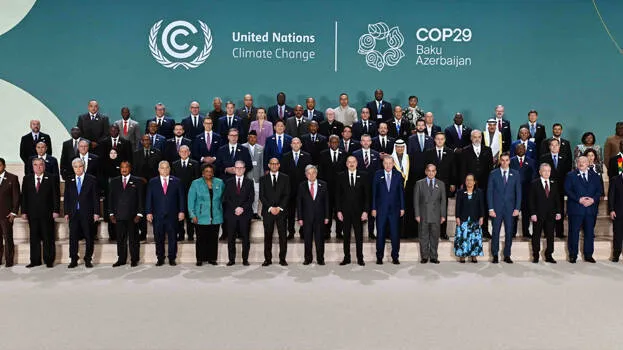

At the 29th UN Climate Change Summit held in Baku, Azerbaijan, from November 11 to 22, 2024, allegations arose that India was denied an opportunity to express its views before the announcement of a financial assistance package. The summit proposed that affluent nations provide $25 billion (₹21.13 lakh crore) annually to poorer countries by 2035 to combat climate disasters. This is the first time a fixed amount for climate aid has been officially proposed at a summit. However, developing countries, including India, demanded an annual contribution of $130 billion.
At the 2009 summit, developed nations agreed to contribute $10 billion annually to developing nations. This agreement is set to expire in 2025. In this context, India criticized the proposed amount as nominal and rejected the package, stating that it was insufficient. Consequently, India was denied the chance to justify its stance. The discussions, attended by representatives from over 200 countries, revealed significant disagreements, with several nations voicing dissent.
Some island nations and a group of developing countries even walked out of the discussions. The financial aid package is currently being funded by countries like the United States, Canada, and members of the European Union. The EU has also proposed that China begin contributing to this fund. While each nation advances its own agenda at such summits, the scope and challenges posed by climate change transcend national borders.
For India, the impact of climate change is evident in the severity of disasters. The Climate India 2024 report provides detailed information about extreme weather events in the country between January and September 2024. During this nine-month period, there were 255 days of extreme weather events in India, resulting in 3,238 deaths. On average, 11 people die daily in India due to climate disasters.
In 2024, India witnessed the destruction of 3.2 million hectares of agricultural land, the loss of 235,000 homes, and the deaths of over 10,000 livestock. A cloudburst alone claimed 33 lives, while cyclones killed 57. Of India's 36 states and union territories, 35 experienced climate-related impacts in 2024.
According to a study by the Indian Council of Medical Research, air pollution alone causes 1.7 million deaths annually in the country. Industrialization, the increasing number of vehicles, agricultural residue burning, and construction activities are significant contributors to air pollution. While many of these activities are integral to human life and difficult to eliminate, some, like burning firewood for cooking or mosquito coils, can be reduced to ensure cleaner indoor air, the study suggests.
The global challenges of carbon emissions and rising temperatures cannot be easily reversed by humanity. However, scientific and technological advancements, combined with strategic observation, can help slow the pace of climate change and develop mitigation measures.
In summary, climate change is an undeniable threat to the entirety of human civilization. If global nations fail to act together now, setting aside their differences, a catastrophic future awaits. To overcome these challenges and build a secure and resilient world for future generations, international cooperation, consensus, and a science-based approach are crucial. Time waits for no one, not even the climate.

(The author is former president of FOKANA and founder-president of NAMAM (USA).